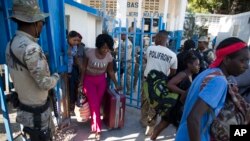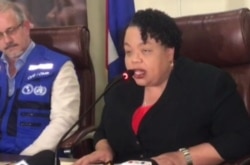The coronavirus pandemic has now arrived in Haiti.
President Jovenel Moise on Thursday confirmed the country’s first two cases of the deadly disease in a national address that was simultaneously streamed live on Facebook.
“I want to let the nation know that according to test results we received from the national laboratory this afternoon while we were holding an emergency ministers’ council meeting, we have confirmed the first two cases of coronavirus in the nation,” Moise said. “The government is appealing for calm,” he added.
It is unclear who the confirmed cases are. This week, a state university professor in Limonade, in northern Haiti, experienced flulike symptoms after returning from a trip to the United States. He self-quarantined and was tested for coronavirus after alerting the university administrator and local public health officials. Over the weekend, a foreign female who had returned to Haiti after a trip to her native country where coronavirus has spread and had experienced flulike symptoms tested negative for the virus.
New emergency measures
A statement sent to VOA Creole lists emergency measures the government plans to enact to stem the spread of the virus in a nation struggling to regain its footing after months of anti-government protests.
The emergency measures include an 8 p.m. curfew, school closures, factory closures, and a limit of 10 people for social gatherings.
As of midnight Thursday, the country’s ports, airports and borders will be closed. Merchandise will still be able to cross the Haiti-Dominican Republic border after being screened on both sides.
The government also announced plans to sanction anyone selling medicine, health products or food on the black market.
Reaction across the nation
VOA Creole reporters in the town of Mirebalais in the south and in the capital, Port au Prince, said people are panicked. Businesses quickly shuttered. In the Delmas neighborhood of the capital, people scrambled to fill up on gas and stock up on food items, and then ran home.
“People look visibly scared,” the reporters said.
Supermarkets in the affluent suburb of Petionville were crowded soon after the presidential announcement ended with people buying food and other essential items.
Health workers concerned
VOA Creole spoke to doctors and nurses at the country’s state-run hospital in Port-au-Prince earlier this month who feared their institution was not ready to handle coronavirus cases.
“It’s sad to say this but the hospital receives a lot of patients daily and we are not — I repeat — we are not ready, as far as I know, to diagnose a person who has the coronavirus,” a doctor said, adding that the hospital doesn't even have the test to determine if someone is infected. Public Health Minister Marie Greta Roy Clement told VOA the national laboratory would handle all coronavirus cases.
Residents of Port-au-Prince and the suburb of Petionville VOA spoke to earlier this week also expressed fear of the pandemic and had little or false information about it and how to protect themselves.
Clement said her ministry was rolling out a nationwide campaign to train health workers and inform the public on best practices to stay healthy.
Yves Manuel, Florence Lisene in Port-au-Prince, Yvan Martin Jasmin in Cape Haitian, and Jean Collegue in Mirebalais contributed to this report.





